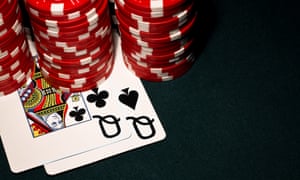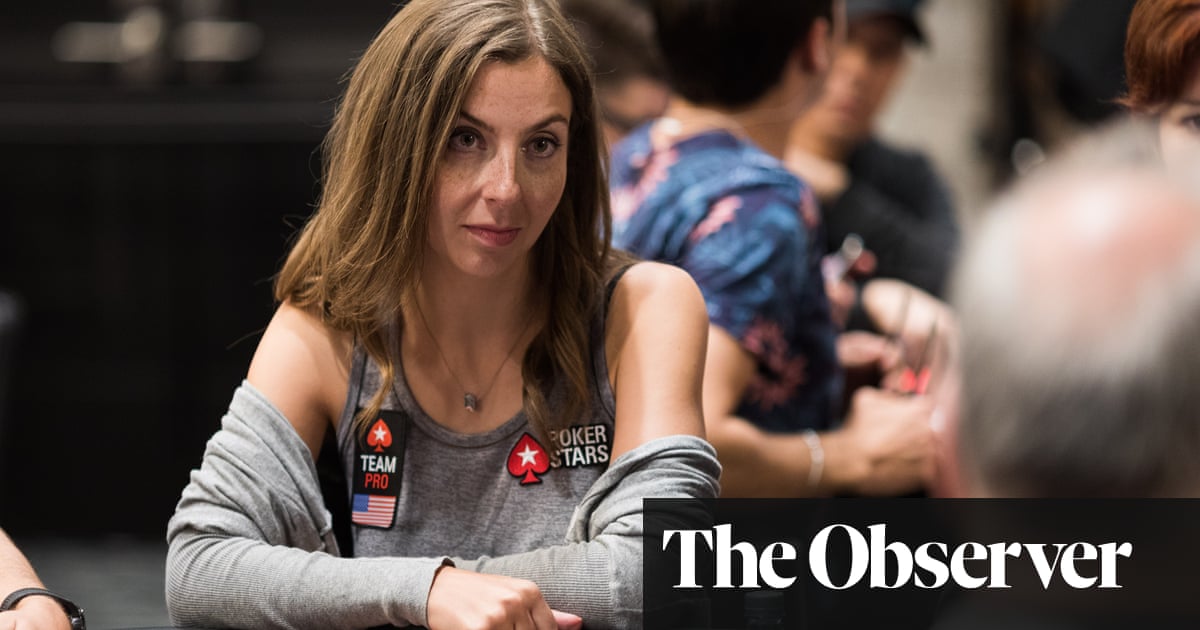People process change in different ways. It is discomfiting to realise just how little control we have over the direction our lives can take. A day passes, a disease we never even knew existed strikes, and the world is suddenly changed. In its face, some turn spiritual. Some turn philosophical. Some turn to the hardest science they can in search of some semblance of ordered explanation. I turned in a direction I would never have previously imagined, to a pursuit that had not only never caught my interest but that I was only vaguely aware even existed: poker.
The more I think about the nature of luck, the more I realise just how big a hand it has had in every single aspect of my existence. As a child, I had perhaps the greatest luck of my life: my parents left the Soviet Union, opening to me a world of opportunity I would never otherwise have had. The sheer, beautiful chance of it all! Just imagine, for a second, if they had stayed. How different my entire subsequent existence would be. As a teen, I used every ounce of skill I had to excel academically and become part of the first generation in my family to make it to college in the United States – but, oh, the luck involved in getting into that college in the first place. How many people who’d worked just as hard as I did would never make it that far because of a happenstance of birth or a quirk of the admissions committee? Just how much of my life could I take credit for, and how much was just simple dumb luck?
For a long time, it was a philosophical question more than anything. But in 2015, the problem of skill versus chance became more personally pressing. In the first week of January, my mother – my role model in almost every way – lost her job of almost 20 years, summarily downsized in a private equity acquisition. A few months later, my vivacious, healthy, living-on-her-own grandmother slipped in the night. The edge of a metal bed frame. Hard linoleum floor. No extra pair of ears to hear anything amiss. The neighbours found her in the morning, alerted by a light that shouldn’t have been turned on. Two days later, she was dead. We never said goodbye. She’d been through World War II, survived Stalin, Khrushchev, Gorbachev, and was defeated by a slippery floor and one misplaced foot. Unfair. Or rather, unlucky. One surer step and she’d still be here.
My husband lost his job next. The startup he’d joined failed to start up as planned and, with that, I momentarily found myself in a position I hadn’t been in for years: supporting my family on a freelance writer’s income. We left our beautiful apartment. We changed our habits. We did our best to adjust. And on top of it all, I found my health suddenly failing. I’d recently been diagnosed with a bizarre autoimmune condition. No one knew quite what it was, but my hormone levels had declared insanity and I was suddenly allergic to just about everything. Sometimes, I couldn’t even leave the apartment: my skin broke out in hives whenever anything touched it, and it was winter outside. I sat huddled over my laptop, draped in an old, loose T-shirt, hoping for the best. I went from expert to expert, steroid regime to steroid regime, only to be told the same thing: idiopathic – doctor-speak for “We don’t have a clue.”

Unfair. Bum luck. But was it? Maybe it had been my fault for failing to listen to my mother and sneaking out to play on the balcony so many years ago. I was born in Russia, after all, and was there for Chernobyl – my mother’s warning to stay inside had its reasons. Maybe my two-year-old self was to blame. I sat reading James Salter – “We cannot imagine these diseases, they are called idiopathic, spontaneous in origin, but we know instinctively there must be something more, some invisible weakness they are exploiting. It is impossible to think they fall at random, it is unbearable to think it” – and I found myself nodding in recognition. Whether it was pure chance or not, it sucked.
Never could I have imagined that I’d seek out any life answers in a game. What can a deck of cards really teach you about the uncertainty of existence? But poker, it turns out, is a game unlike most others. It isn’t the roulette wheel of pure chance, nor is it the chess of mathematical elegance and perfect information. Like the world we inhabit, it consists of both. At its heart, poker is a game of incomplete information. There’s the information I hold in private (my hole cards, known only to me); there’s the information everyone knows (the community cards that are dealt face up on the table); and there’s the information that I can start to guess at but can never know for sure (the cards of every other player). How can I make the best decision possible, given what I know, what I don’t know, and what I can guess at? How do I make that decision with confidence, knowing that I can never be completely certain that I’m right – and that even if I am, the remaining cards in the deck might go against me, rendering my correct decision seemingly useless in the face of an unfortunate outcome? Anyone can get lucky – or unlucky – at a single hand, a single game, a single tournament. One turn and you’re on top of the world – another, you are cast out, no matter your skill, training, preparation, aptitude. In the end, though, luck is a short-term friend or foe. Skill shines through over the longer time horizon. Provided, of course, you survive long enough to get there.
Life is messy. It can’t ever be mapped cleanly. Every day consists of making the best decisions you can from information that can never be complete. Poker is a way to conceptualize the mess, clean its parameters just enough to allow you to grapple with uncertainty with some semblance of control. You never know someone else’s mind, just like you can never know any poker hand but your own–but you can do your best with what you have.
As I learned more about the game, I began to genuinely wonder if, in poker, I could finally find a way to overcome my all-too-human inability to disentangle chance from skill in the morass of daily life and instead learn to master it. For two years I spent almost every waking moment in the game. When I wasn’t playing it, I was studying it. I travelled to the edges of reason, swapping the hallways of Manhattan magazines for the gambling dens of Macau. To the me of a year earlier, my life would look entirely unrecognisable. Who is this person spending eight months of the year on planes and in casinos? Who is this person, poring over strange matrices of cards on her computer, talking about game theory this and expected value that, instead of nodding her head as a scientist explains the latest theory about the human mind and talking through the ideal structure of a sentence with her editors? And isn’t it strange that the only reading material I can consistently spy under her arm is…what is that? A book of poker strategy?
I didn’t just learn the rules of the game. I learned about the intricacies of my own psyche. I learned about the pitfalls of my decision making. About the way I let people bully me because I was afraid of seeming anything other than nice. But what I learned above all is how to rise above the noise: how to embrace uncertainty rather than fear it, reframing the very thing that once petrified me – my utter lack of control over certain key elements of my life – into something that I could instead use as a source of power.
I remember well the conversation that was, in a way, responsible for the change. It takes me back to Las Vegas, in the early days of my poker journey, the winter of 2017. I’d just come this close to clinching my first ever tournament cash when an unlucky run of cards rendered me the bubble girl – that is, the last person eliminated from the tournament before everyone else is guaranteed to come away with a profit. How unfair! I couldn’t wait to tell every detail of how I’d been robbed of my rightful victory to my coach, Erik Seidel – one of the legends of the poker world. Surely, he would empathise. After all, he’d been playing poker for more than three decades.
“Stop,” he said, when I hadn’t even done with the part about having my shove called after flopping the nines. I stopped, a bit confused. We haven’t even got to the good (or, rather, bad) bit. And it’s very unlike Erik to cut me off. He’s one of the best listeners I know. I look at him expectantly. “Do you have a question about how you played the hand?” he asked.
“Well, not really,” I answered. “I mean, I had a set…”
“I don’t want to hear it.”
I was taken aback. Isn’t it the place of a coach to listen to his student – not tell her he doesn’t want to hear it?
“Look, every player is going to want to tell you about the time their aces got cracked. Don’t be that player,” he continued. “Bad beats [when a player really should have won, but was beaten by a less skilled opponent who got a lucky last-minute break] are a really bad mental habit. You don’t want to ever dwell on them. It doesn’t help you become a better player. It’s like dumping your garbage on someone else’s lawn. It just stinks.”
Well, that certainly got the point across. But wasn’t I allowed to vent just a bit?
As it turned out, no, no I wasn’t.
“Focus on the process, not the luck. Did I play correctly? Everything else is just BS in our heads,” Erik tells me. “Thinking that way won’t get you anywhere. You know about the randomness of it but it doesn’t help to think about it. You want to make sure you’re not the person in the poker room saying, ‘Can you believe what happened?’ That’s the other people.” he said.
I hadn’t quite thought of it that way, but the words hit home. That was the moment I realised just how much poker might teach me about one of the single most important tools in our mental arsenal: emotional resilience. How we frame something affects not just our thinking but our emotional state. It may seem a small deal, but the words we select – the ones we filter out and the ones we eventually choose to put forward – are a mirror to our thinking.

The language we use becomes our mental habits – and our mental habits determine how we learn, how we grow, what we become. It’s not just a question of semantics: telling bad beat stories matters. Our thinking about luck has real consequences in terms of our emotional wellbeing, our decisions, and the way we implicitly view the world and our role in it. There is no such thing as objective reality. Every time we experience something, we interpret it for ourselves. How we phrase sentences can determine whether we have an internal or external locus of control, whether we are masters of our fates or peons of forces beyond us. Do we see ourselves as victims or victors? A victim: the cards went against me. Things are being done to me, things are happening around me, and I am neither to blame nor in control. A victor: I made the correct decision. Sure, the outcome didn’t go my way, but I thought correctly under pressure. And that’s the skill I can control.
The repercussions of that frame shift are worth considering. In poker, if you’re one of the bad-beat dwellers, you can still just hop into the next tournament and regale the table with talk of the unfairness of the poker gods. If you suffer a bad beat in life, it may set you back considerably more, and last a lot longer. All of a sudden, your framing matters. A victim of the cruel cards? This may serve as something I think of as a luck-dampener effect: because you’re wallowing in your misfortune, you fail to see the things you could be doing to overcome it. Potential opportunities pass you by; people get tired of hearing you complain, so your social network of support and opportunities also dwindles; you don’t even attempt certain activities because you think, I’ll lose anyway, why try? Your mental health suffers and the spiral continues.
What if you think of yourself instead as an almost- victor who thought correctly and did everything possible but was foiled by crap variance? No matter: you will have other opportunities, and if you keep thinking correctly, eventually it will even out. These are the seeds of resilience, of being able to overcome the bad beats that you can’t avoid and mentally position yourself to be prepared for the next time. People share things with you: if you’ve lost your job, your social network thinks of you when new jobs come up; if you’re recently divorced or separated or bereaved, and someone single who may be a good match pops up, you’re top of mind. That attitude is what I think of as a luck amplifier. Sure, you can’t actually change the cards, but you will feel a whole lot happier and better adjusted while you take life’s blows, and your ready mindset will prepare you for the change in variance that will come at some point, even if that point is far in the future.
Poker has given me many things. Better decision making abilities. A better understanding of probabilistic thinking, the nature of chance, the nature of incomplete information. A way of dealing with the things out of my control, of making peace with the elements of my life that simply won’t be reined in. It has even helped my husband turn his job loss into a job gain: not a loss, but an opportunity to do what he’s always wanted, start his own business. But this – this may be its greatest gift of all. The gift of the no-bad-beat mindset. The ability to move on from the inevitable bad beats that life throws in my direction – because I know that I have no ability to change the runout of the cards.
What I can change are the circumstances around that runout. How I react. How I respond. How I move on. Forget the bad beat, and make a concrete plan of action that I can execute, on how to make such bad beats less likely in the future. How can I craft a table environment where the bad beats are limited? How can I survive the runouts that don’t go my way, and still think clearly on the other side? This, in the end, may be poker’s biggest life lesson.
The Biggest Bluff: How I Learned to Pay Attention, Master Myself, and Win by Maria Konnikova (HarperCollins, £20) is out now. If you are affected by any of these issues, please contact gamcare.org.uk; 0808 8020 133
